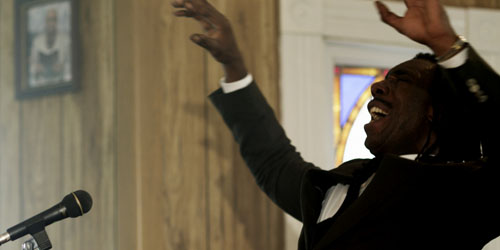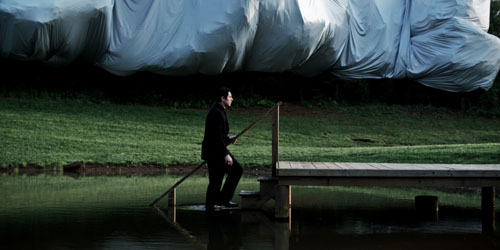 Back to selection
Back to selection
Five Questions with Faces in the Mirror Producer/Writer/Composer Boyd Tinsley
 Boyd Tinsley in Faces in the Mirror
Boyd Tinsley in Faces in the Mirror  Boyd Tinsley’s name and face are known to millions of admirers all over the globe – but not for his film work. Tinsley has spent the past two decades of his life as the violinist for the Dave Matthews Band, going platinum dozens of times over. But with the release of Faces In The Mirror, Tinsley enters into the world of film for the first time, adding producer and screenwriter to his resume. Though the actors in Faces don’t sing, it’s almost a sort of cinematic opera. The film follows the personal odyssey of Ben (Ryan Orr), a man who has just lost his father – the story of Ben coming to terms with his tragedy is told primarily through songs (also written by Tinsley). The end result is an unusual, slightly surreal film that Tinsley refers to as a “psychedelic drama,” incorporating music, poetry, and a minimum of dialogue – a natural step for a musician, perhaps, but an unorthodox one for a filmmaker. But on August 30, the whole world will be able to witness Faces In The Mirror‘s premiere, which will be broadcast online at SnagFilms.com live from Seattle, followed by a post-screening concert.
Boyd Tinsley’s name and face are known to millions of admirers all over the globe – but not for his film work. Tinsley has spent the past two decades of his life as the violinist for the Dave Matthews Band, going platinum dozens of times over. But with the release of Faces In The Mirror, Tinsley enters into the world of film for the first time, adding producer and screenwriter to his resume. Though the actors in Faces don’t sing, it’s almost a sort of cinematic opera. The film follows the personal odyssey of Ben (Ryan Orr), a man who has just lost his father – the story of Ben coming to terms with his tragedy is told primarily through songs (also written by Tinsley). The end result is an unusual, slightly surreal film that Tinsley refers to as a “psychedelic drama,” incorporating music, poetry, and a minimum of dialogue – a natural step for a musician, perhaps, but an unorthodox one for a filmmaker. But on August 30, the whole world will be able to witness Faces In The Mirror‘s premiere, which will be broadcast online at SnagFilms.com live from Seattle, followed by a post-screening concert.

Filmmaker: The story feels like it comes from a personal place, how much of it relates to your own experience?
Tinsley: The story does come from a personal place. It comes from a period in my life where I was really down after Leroi Moore, our sax player, had died in the fall of 2008. I was just so down I knew the only thing that would help me back up was to do something creative. Doing a film was something I had been thinking about for 15 years at different times. It hit me – it’s time to do a film. Leroi’s death was definitely a part of the story that deals with grief and pain, but…in building a character for the film, I wanted to have something of the character’s life that was also in the life of the actor himself. I wanted the actor to be able to bring some truth to the character from is own experience. Ryan Orr, the lead actor in this, his father had died about three or four years earlier…that was still fresh with him. I thought this was something he could bring a lot of realism, a lot of feeling to. So it’s a combination of his life and my life at the time that sort of created the beginnings of that story.
Filmmaker: What has your relationship with film been throughout your life? What directors have affected you the most?
Tinsley: I’ve always loved films. I grew up in the ‘70s and there were a lot of classic films on TV on Sundays. One of the directors I learned about through TV in the ‘70s was Hitchcock. Of course The Birds would come on TV, Psycho would come on TV, those were my first exposure to him, but I went on to watch Rear Window and North By Northwest and Vertigo. I loved Hitchcock’s style. A lot of those movies that he did with [composer] Bernard Hermann; it’s like the music and the film were both telling the story, it was almost like the music was another character in the story. That was something that I always loved. I wanted to feel something emotional when something big happens on screen – the music should accompany that. Hitchcock sometimes will be very spare on the dialogue, he will let the music speak for him. One of the boldest things I think I’ve ever seen on film is that long period of silence [in North by Northwest] when Cary Grant goes out to the Kansas cornfields to find that secret agent that doesn’t actually exist. There’s nothing but a few cars whizzing by every now and then, the sound of tumbleweeds going by, this silence goes on forever — he keeps the suspense going. It’s almost like the silence speaks louder than if there were words and music there. So things like that always impressed me. Hitchcock gave me a lot of courage, and he’s definitely the director that’s most influential to me. I will do everything I can do to make people feel something, to make the movie and the music dance together.
Filmmaker: There are some really evocative outdoor settings in the film. Where were those shot?
Tinsley: All of the movie was shot in Charlottesville, Virginia. A few years before we started filming, [co-executive producer] Fenton Williams and I – he was the lighting director of DMB, and neither one of us happened to have done a movie but we had both wanted to – we just happened to be at a photo shoot in Charlottesville one day at the peak of fall foliage, which is absolutely beautiful. It’s surrounded by mountains and trees, we were just sort of looking out on this balcony during the photo shoot and one of us said, “It would be so great to film a movie in Charlottesville in the fall,” and the other one said “I was just thinking the same thing.” Fenton and I are on the same wavelength on a lot of things creatively, and that was the first notion that we had together that “Hey, we’re gonna make a movie.” We knew that we wanted to include some of the natural beauty of Charlottesville in this movie. We didn’t actually get to shooting until the spring. We just happened to get lucky, and found the perfect spring days for our shooting, particularly if you look at the funeral scene. I’ve never seen flowers and plants look so perfect and so beautiful and so lush. We had a great cinematographer, Johnny St. Ours, that captured that. Aaron [Farrington, director] is the one that set up these amazing shots. It just really blew me away to realize how fortunate we are to live in a place that’s so beautiful and how fortunate we were to have some amazing days. We knew that we had this beautiful landscape, that was one of the natural gifts that we had being where we were, so we used that a lot, it’s really a big part of the emotion of the film.
Filmmaker: How did Aaron Farrington come to direct the film?
Tinsley: I had never made a movie before and I really did not know the mechanics of filmmaking, but the thing that I had was that I knew what I wanted the movie to do. Aaron was brought on board by Fenton Williams…Fenton was the person I called up when I decided to make this movie initially, to direct it. But Fenton is also the director of lighting for the Dave Matthews Band, so he didn’t really have the time to spend on this project. It started off initially to be a 20-minute short, and Fenton said, “Okay, we can do this in a matter of weeks.” And then along the process of planning this, we decided to make this a full feature-length film. Then Fenton said, “Well, I’m gonna have to have someone else come in.” Aaron was mostly a photographer…but the way he shot, he also liked to use Super 8 a lot, and I just loved the feel of that, and I liked his vibe. He and I didn’t know very much about each other, but I could tell that he got it, like when we were talking about the music and how it would fit in with different scenes. He has the most beautiful, amazing shots. When I work with him, we’ll talk about scenes, but we’ll talk about what I want in a very general sense. There’s this one scene in the movie where there’s a big bonfire. I just told him, “I want this big bonfire scene with young people dancing around it,” and a few other elements, but I never said anything about how it was supposed to look, how it was supposed to feel. And he just went to this place that I would never have imagined. He takes what I ask him and he makes it 10 times better than I could ever have imagined.
Filmmaker: How early in the process did you know that you wanted the songs to carry the bulk of the narrative?
Tinsley: This whole idea came from my head, things like making the music first and making the movie dance with the music, having very minimal dialogue. There was a whole lot that was just in my head. Creating the emotion between the film and the music, letting those two mirror each other and become one so you have this dual emotional experience. Even the storytelling is more from the emotions you feel from the music and that you feel from the lead character, his eyes, his charisma, what he’s showing us from his body language – very much like a silent picture. This movie’s so visually stimulating – one of the terms that comes to mind is it’s like a psychedelic drama. It’s very dreamlike, very visual. So Aaron and I did, for a few years, create our own way of making a movie. Aaron had made videos, of course I had shot videos with the Dave Matthews Band, but we’d never really made a movie before, so in doing that we had license to do it any way that we want. Working with Aaron is amazing, I’ve never worked with somebody for two years straight in a very small room before and not gone for their throat [laughs].
